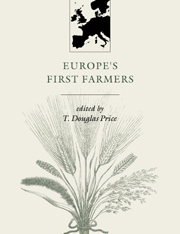Book contents
- Frontmatter
- Contents
- List of illustrations
- List of tables
- Preface
- List of contributors
- 1 Europe's first farmers: an introduction
- 2 Southeastern Europe in the transition to agriculture in Europe: bridge, buffer, or mosaic
- 3 Transition to agriculture in eastern Europe
- 4 Cardial pottery and the agricultural transition in Mediterranean Europe
- 5 Mesolithic and Neolithic interaction in southern France and northern Italy: new data and current hypotheses
- 6 From the Mesolithic to the Neolithic in the Iberian peninsula
- 7 The origins of agriculture in south-central Europe
- 8 How agriculture came to north-central Europe
- 9 Getting back to basics: transitions to farming in Ireland and Britain
- 10 The introduction of farming in northern Europe
- 11 Lessons in the transition to agriculture
- Bibliography
- Index
9 - Getting back to basics: transitions to farming in Ireland and Britain
Published online by Cambridge University Press: 18 December 2009
- Frontmatter
- Contents
- List of illustrations
- List of tables
- Preface
- List of contributors
- 1 Europe's first farmers: an introduction
- 2 Southeastern Europe in the transition to agriculture in Europe: bridge, buffer, or mosaic
- 3 Transition to agriculture in eastern Europe
- 4 Cardial pottery and the agricultural transition in Mediterranean Europe
- 5 Mesolithic and Neolithic interaction in southern France and northern Italy: new data and current hypotheses
- 6 From the Mesolithic to the Neolithic in the Iberian peninsula
- 7 The origins of agriculture in south-central Europe
- 8 How agriculture came to north-central Europe
- 9 Getting back to basics: transitions to farming in Ireland and Britain
- 10 The introduction of farming in northern Europe
- 11 Lessons in the transition to agriculture
- Bibliography
- Index
Summary
Introduction
In the case of Britain and Ireland changes from a hunter-gatherer to a farming lifestyle have been written about with a prolific frequency. Any objective assessment of the problems must emphasize the fact that opinions are much more easily discovered than information based on the observation of actual archaeological data. While this is not something peculiar to this topic or region, given that so much of our later prehistory is based on the presumed impact of agriculture, it places this particular topic in a special position.
Problems associated with the lack of information have obviously been compounded by the realization since the 1970s that the use of simple chronological phases, based on observed changes in material culture, may have masked a more complex process of change. However this realization has resulted in the collapse of one framework of investigation and a substitution of a much more relative approach which has often lacked its own critical framework of analysis. There is often a substitution of the implicit assumptions of traditional archaeology with an over-reliance on a few economic indicators, which are also used to express an equally simple view. The archaeological record, particularly radiocarbon dating and pollen analysis, is raided for information which supports a particular perspective.
Britain and Ireland should provide a fascinating case study of a group of islands where the processes of change from hunter-gatherer to farmer can be studied, a point emphasized in an Irish context by Zvelebil and Rowley-Conwy (1986:75). Yet the British Isles is a region where, for a variety of reasons, there is a limited range of information which can contribute meaningfully to these discussions.
- Type
- Chapter
- Information
- Europe's First Farmers , pp. 219 - 259Publisher: Cambridge University PressPrint publication year: 2000
- 11
- Cited by



